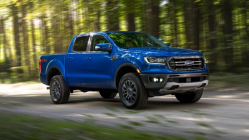
— A Ford fuel economy lawsuit alleges F-150 and Ranger trucks were sold with inaccurate fuel economy ratings listed on the window stickers.
The 2019-2020 Ford Ranger and 2018-2020 Ford F-150 trucks were allegedly advertised and sold with the wrong fuel economy estimates because the automaker allegedly cheated on fuel economy testing.
Ford allegedly used inaccurate fuel economy ratings on the window stickers to sell and lease the trucks.
"Over a million Ford truck owners are now driving vehicles that will cost them thousands of dollars more to own or lease than they anticipated. Because of Ford’s deception, all purchasers and lessees of these vehicles paid more for these vehicles than they are actually worth." - Ford truck lawsuit
According to the lawsuit, Ford manipulated its coastdown testing and allegedly used inaccurate drag and resistance figures to increase the Environmental Protection Agency (EPA) mileage ratings.
The class action says the coastdown test is used by an automaker to determine the metrics used to estimate fuel economy. The test indicates how much rolling resistance and drag a vehicle has when tested on a dynamometer.
The window sticker (Monroney label) for a 2018 Ford F-150 V6 indicates fuel economy estimates of 20 mpg city, 26 highway and 22 combined. But the lawsuit alleges the real highway fuel number is 22.7 mpg and city driving is 17.7 mpg.
Assuming the lifetime of a truck is 150,000 miles, city driving would allegedly consume an extra 821 gallons of fuel and an extra 968 gallons for highway driving over the lifetime of the truck.
According to the fuel economy lawsuit, Ford overstated the mpg ratings so advertisements would indicate a fuel economy that would beat the competition and look better to consumers.
In addition, Ford could allegedly earn more credits under the U.S. CAFE environmental regulations since less fuel burned means less emissions.
Ford also allegedly miscalculated the “Road Load, which is the force that is imparted on a vehicle while driving at a constant speed over a smooth, level surface from sources such as tire-rolling resistance, driveline losses, and aerodynamic drag."
Ford's lab tests allegedly did not take these forces into account which allegedly caused inaccurate fuel economy estimates.
The Ford fuel economy lawsuit was filed in the U.S. District Court for the Eastern District of Michigan: Ceremello, et al., v. Ford Motor Company.
The plaintiffs are represented by the Miller Law Firm, P.C., and Hagens Berman.
CarComplaints.com has complaints from drivers of Ford F-150 trucks and Ford Ranger trucks.




